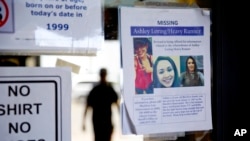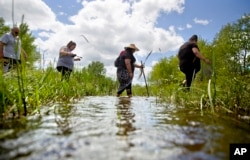The searchers rummage through the abandoned trailer, flipping over a battered couch, unfurling a stained sheet, looking for clues. It's blistering hot and a grizzly bear lurking in the brush unleashes a menacing growl. But they can't stop.
Not when a loved one is still missing.
Ashley HeavyRunner Loring, a 20-year-old member of the Blackfeet Nation, was last heard from around June 8, 2017. Since then her older sister, Kimberly, has been looking for her.
"I need to do this," says 24-year-old Kimberly. "I don't want to search until I'm 80. But if I have to, I will."
Ashley's disappearance is one small chapter in the unsettling story of missing and murdered Native American women and girls. No one knows precisely how many there are because some cases go unreported, others aren't documented thoroughly and there isn't a specific government database tracking these cases. But one U.S. senator with victims in her home state calls this an epidemic, a long-standing problem linked to inadequate resources, outright indifference and a confusing jurisdictional maze.
Now, in the era of #MeToo, this issue is gaining political traction as an expanding activist movement focuses on Native women, a population with some of the nation's highest rates of sexual violence and domestic abuse.
For many, the issue is deeply personal.
"I can't think of a single person that I know ... who doesn't have some sort of experience," says Ivan MacDonald, a member of the Blackfeet Nation. "These women aren't just statistics. These are grandma, these are mom. This is an aunt, this is a daughter."
MacDonald and his sister, Ivy, recently produced a documentary on Native American women and girls in Montana who've vanished or been killed. Among them: their 7-year-old cousin, Monica, who disappeared from school in 1979. Her body was found frozen on a mountain, and no one has ever been arrested.
There are many similar mysteries. Sometimes, there's a quick resolution. But often, there's frustration with tribal police and federal authorities, and a feeling many cases aren't handled urgently or thoroughly.
"It boils down to racism," MacDonald argues. "You could sort of tie it into poverty or drug use or some of those factors ... (but) the federal government doesn't really give a crap at the end of the day."
Tribal police and investigators from the federal Bureau of Indian Affairs serve as law enforcement on reservations, which are sovereign nations. But the FBI investigates certain offenses and, if there's ample evidence, the U.S. Department of Justice prosecutes major felonies such as murder, kidnapping and rape if they occur on tribal lands.
Former North Dakota federal prosecutor Tim Purdon calls it a "jurisdictional thicket" of overlapping authority and different laws depending on the crime, where it happened (on a reservation or not) and whether a tribal member is the victim or perpetrator. Missing person cases on reservations can be especially tricky. Some people run away, but if a crime is suspected, it's difficult to know how to get help.
Sarah Deer, a University of Kansas professor, author of a book on sexual violence in Indian Country and member of the Muscogee (Creek) Nation, says Native women have long been considered disposable and that's "made us more of a target, particularly for the women who have addiction issues, PTSD and other kinds of maladies."
That attitude permeates reservations where tribal police are frequently stretched thin and lack training and families complain officers can be slow to respond, telling them their loved ones will eventually return.
U.S. Sen. Heidi Heitkamp is trying to address these problems with "Savanna's Act," named after Savanna LaFontaine-Greywind, 22, who was murdered in North Dakota in 2017 while eight months pregnant. Neighbors cut her baby girl from her womb. The child survived. A woman pleaded guilty, and her boyfriend awaits trial.
The bill proposed by Heitkamp, a North Dakota Democrat, aims to improve tribal access to federal crime information databases. It would also require the Department of Justice to develop a protocol to respond to cases of missing and murdered Native Americans.
Lawmakers in a few states also are responding with measures that aim to get a better handle on the magnitude of the problem. A 2016 federal stud y found more than 80 percent of Native women experience violence in their lives.
For the Blackfeet Nation, which has seen cases of domestic abuse and murder, Ashley's disappearance is just the latest trauma.
Posters of her are scattered around town, showing a fresh-faced woman flashing the peace sign.
Kimberly remembers her sister as funny and feisty, the keeper of the family photo albums who always carried a camera. She learned to ride a horse before a bike and liked to whip up giant breakfasts of biscuits and gravy.
The Bureau of Indian Affairs, working with the tribal police, headed up an initial investigation. BIA spokeswoman Nedra Darling says 55 people were interviewed and 38 searches conducted and there are persons of interest. The FBI took charge in January after a lead took investigators off the reservation into another state, Darling adds. The FBI declined comment. A $10,000 reward is being offered.
One recent weekend at the annual North American Indian Days in Browning, Ashley's family marched in a parade with a red banner honoring missing and murdered indigenous women.
They wore T-shirts with an image of Ashley, her long hair blowing in the wind, and the words: "We will never give up."





